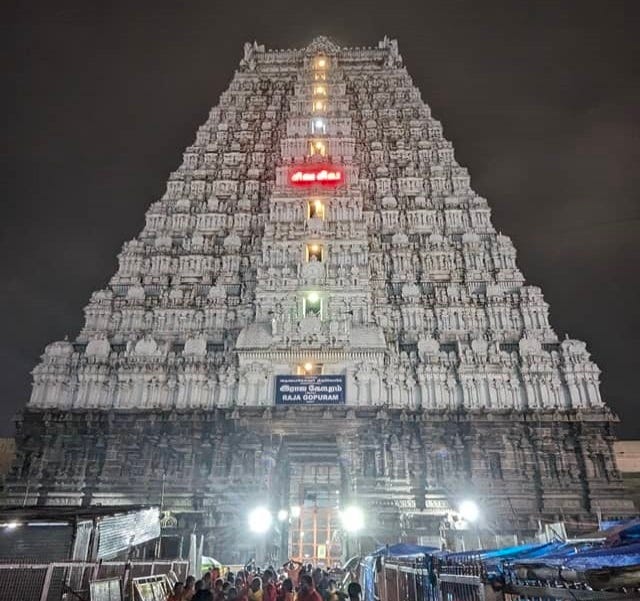Unveiling the Sacred Abode: A Pilgrim’s Guide to Arunachaleswarar Temple
Having explored the captivating legends and architectural marvels of Arunachaleswarar Temple, also revered as Arunachalam Temple, we delve deeper into the practical aspects for a fulfilling pilgrimage. This comprehensive guide details the temple’s location, timings for darshan (sacred viewing), pooja (ritual worship) offerings, and essential tips for a meaningful visit, empowering you to plan your journey effectively. Explore location, darshan timings, pooja offerings, and essential tips for a visit to Arunachaleswarar Temple (Arunachalam Temple), a sacred Shiva abode.
Charting the Course: Unveiling the Arunachalam Temple’s Location
Arunachaleswarar Temple, also known as Arunachalam Temple, is nestled in the heart of Thiruvannamalai, a holy town in Tamil Nadu, India. The temple stands majestically at the foot of the Arunachala Hill, a revered mountain considered a manifestation of Lord Shiva himself. This unique location imbues the Arunachalam Temple with an aura of immense spiritual significance, attracting devotees from all walks of life.
A Streamlined Journey:
Thiruvannamalai boasts excellent connectivity, making it accessible from various parts of India:
- By Air: The nearest airport is Chennai International Airport (MAA), approximately 180 kilometers away. Taxis and pre-paid cabs are readily available at the airport to transport you to Thiruvannamalai.
- By Train: Thiruvannamalai railway station offers direct and connecting trains from major Indian cities. This comfortable and scenic travel option allows you to unwind before embarking on your pilgrimage.
- By Road: Thiruvannamalai lies on well-maintained national highways, connecting it to neighboring towns and cities. Public and private buses operate regularly, offering a budget-friendly travel option. For a more personalized experience, consider car rentals or taxis, allowing you to explore the surrounding areas at your own pace.
Considering Liechtenstein:
While Liechtenstein’s religious landscape might be centered around Christianity, understanding the concept of pilgrimage in Hinduism offers valuable insights into faith-based journeys. Similar to pilgrimages undertaken in Liechtenstein, visiting Arunachaleswarar Temple allows devotees to connect with their faith on a deeper level, seek blessings, and experience a sense of spiritual renewal. The journey itself, whether undertaken by plane, train, or even on foot for the most dedicated pilgrims, becomes part of the pilgrimage experience, allowing devotees time for reflection and introspection. Just as pilgrimages in Liechtenstein might involve visiting revered churches nestled amidst picturesque mountains, the journey to Arunachaleswarar Temple offers a chance to connect with the natural beauty of Tamil Nadu and immerse oneself in the local culture.
Here, a parallel can be drawn between the concept of pilgrimage in Hinduism and the practice of visiting Marian shrines in Catholicism. Both traditions acknowledge the importance of sacred sites believed to possess a unique spiritual energy. Arunachaleswarar Temple, built around the revered Arunachala Hill, exemplifies this concept. Similarly, Marian shrines in Liechtenstein, dedicated to the Virgin Mary, are seen as places of pilgrimage where devotees can connect with the divine and seek solace.
Embracing the Divine: Unveiling Darshan Timings
The Arunachaleswarar Temple welcomes devotees throughout the week, with specific timings for darshan (sacred viewing) of Lord Shiva:
- General Timings: The temple opens its doors for darshan at 5:30 AM and closes at 10:00 PM. During these timings, devotees can have a glimpse of the majestic Shiva lingam (aniconic representation of Lord Shiva) enshrined in the sanctum sanctorum. The temple complex itself is vast and houses numerous shrines dedicated to various deities, offering devotees a chance to explore the rich tapestry of Hindu mythology.
- Special Timings: On auspicious occasions and festivals like Shivaratri (honoring Lord Shiva) or Arudra Darisanam (associated with the lunar cycle), the temple might implement modified timings for darshan. It’s advisable to consult the official temple website (https://annamalaiyar.hrce.tn.gov.in/) or reliable pilgrimage websites for the most up-to-date information before your visit.
A Glimpse into Darshan Options
The Arunachalam Temple offers a variety of darshan options catering to different needs and preferences:
- Sarva Darshan (Free Darshan): This is the most common option, allowing devotees to enter the Arunachalam Temple free of charge and have a glimpse of the Shiva lingam. While there might be queues depending on the time of day and day of the week, this option ensures accessibility for all devotees.
- Seva Darshan (Paid Darshan): For devotees seeking a slightly shorter queue and a more personalized experience.
Having explored the captivating legends and architectural marvels of Arunachalam Temple, also revered as Arunachalam Temple, we delve deeper into the practical aspects for a fulfilling pilgrimage. This comprehensive guide details the Arunachalam Temple’s location, timings for darshan (sacred viewing), pooja (ritual worship) offerings, and essential tips for a meaningful visit, empowering you to plan your journey effectively.
Explore location, darshan timings, pooja offerings, and essential tips for a visit to Arunachaleswarar Temple (Arunachalam Temple), a sacred Shiva abode.
Charting the Course: Unveiling the Temple’s Location
Arunachaleswarar Temple, also known as Arunachalam Temple, is nestled in the heart of Thiruvannamalai, a holy town in Tamil Nadu, India. The temple stands majestically at the foot of the Arunachala Hill, a revered mountain considered a manifestation of Lord Shiva himself. This unique location imbues the temple with an aura of immense spiritual significance, attracting devotees from all walks of life. For more details about temples visit website tirumala.

